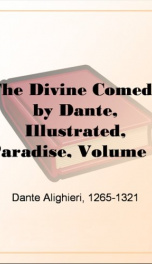The Divine Comedy by Dante, Illustrated, Paradise, Volume 1

“Divine Comedy” by an Italian poet of the Middle Ages Dante Alighieri appeared in uneasy early fourteenth century and is still regarded as the greatest piece of Italian poetical literature. Being a profound philosophical and mystical work, it is a true encyclopedia of moral natural, theological knowledge, knowledge on botany, history, astronomy. “Divine Comedy” is built upon constant reiteration of three (divine triad) and ten (perfection). It consists of three parts - Hell, Purgatory and Paradise – each including 33 cantos plus additional canto for Hell, 100 in general. The Comedy has more that one stratum: it is both personal drama of the poet, and allegorical description of Florence life, and an account of the world. The first part tells of the inorganic, in “Purgatory” – of animate nature, and in “Paradise” the author presents his metaphysical views. “Hell” immerses readers into the depths of human vices; “Purgatory” gives hope that all sins can be disposed of when the long way of ascent begins. The journey of the poet through these three worlds appears a symbolic journey of the humanity in search of truth.
Info about the book
Author:
Series:
Unknown
ASIN:
B004TPHBB8
Rating:
1/5 (40)Your rating:
0/5
Languge:
English
Users who have this book
Users who want this book
What readers are saying
What do you think? Write your own comment on this book!
write a commentGenre
if you like The Divine Comedy by Dante, Illustrated, Paradise, Volume 1 try:
Other books by this author
Do you want to read a book that interests you? It’s EASY!
Create an account and send a request for reading to other users on the Webpage of the book!


